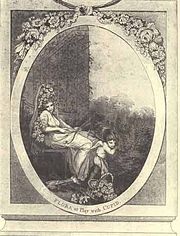
Emma Crewe
Encyclopedia

Richard Polwhele
Richard Polwhele was a Cornish clergyman, poet and topographer.-Biography:Born at Truro, Cornwall, Polwhele met literary luminaries Catharine Macaulay and Hannah More at an early age. He was educated at Truro Grammar School, where he precociously published The Fate of Llewellyn...
's The Unsex'd Females
The Unsex'd Females
The Unsex'd Females, a Poem , by Richard Polwhele, is a polemical intervention into the public debates over the role of women at the end of the 18th century. The poem is primarily concerned with what Polwhele characterizes as the encroachment of radical French political and philosophical ideas into...
, for having painted the Frontispiece to Erasmus Darwin
Erasmus Darwin
Erasmus Darwin was an English physician who turned down George III's invitation to be a physician to the King. One of the key thinkers of the Midlands Enlightenment, he was also a natural philosopher, physiologist, slave trade abolitionist,inventor and poet...
's The Loves of the Plants: "There is a charming delicacy in most of the pictures of Miss Emma Crewe; though I think, in her "Flora at play with Cupid," … she has rather overstepped the modesty of nature, by giving the portrait an air of voluptuousness too luxuriously melting."
Resources
- Reilly, Robin. “Wedgwood, Josiah (1730–1795).” Oxford Dictionary of National Biography. Ed. H. C. G. Matthew and Brian Harrison. Oxford: OUP, 2004. 8 May 2007.

